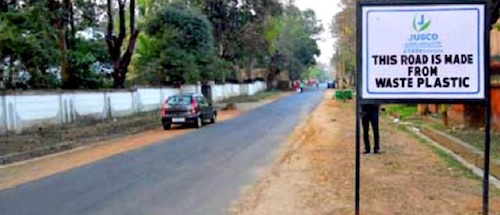The good news: Innovators are coming up with ways to reuse ocean trash. The Bad News.. we have ocean trash. There are several countries that are paving the way to not just ridding our oceans of it’s plastic trash, they have come up with ways to reuse the plastic in cost effective ways.

The benefits of Ocean Plastic Roads
- It’s a cheap commodity and there is plenty of plastic.: 275 million tons of plastic every single year in the world.
- It’s free! Not really free, as one has to collect it, but it is cheaper than asphalt
- Durable; plastic road materials can withstand temperatures from -40º to 176º while maintaining strength and durability.
- Reusing a petroleum product.
- A recycled plastic road is up to 60 percent stronger than a standard asphalt road and can last for 10 years.
- Easy to maintain and repair.
- Reduces dependence on oil and all that that entails.
- One kilometer of plastic road uses about of 1 million plastic bags and costs 8% less than a asphalt or conventional road to pave.
- Saves marine life both in and out of the ocean.
- Prevents overfishing.
Ghana: Nelson Boateng of Nelplast developed a form of asphalt made predominantly from plastic waste, particularly plastic bags, according to Cameroon Radio TV.
India: 1.3 Billion people use 11 kilograms of plastic per year. Two of India’s rivers are re-known for spilling the most plastic pollution into the ocean. As fisherman continue to seek alternative ways to make a living from the sea, Indian Fisherman are now trolling for trash. In an new programs, Suchitwa Sagaram, ‘Clean Sea’ fisheries have caught over 25 tons of ocean plastic which they will sort and turn the ocean plastic into roads.
Tamil Nadu, India, where throughout the last five years, more than 1,600 tons of plastic have been used to lay over 620 miles of roads! (Source)
Netherlands: VolkerWessels set out in 2015 to recycle ocean refuse and use it for a new network of roads and highways in Rotterdam. Known as the PlasticRoad.
PlasticRoad video from VolkerWessels on Vimeo.
Utila, Honduras; One loves island paradises, but like all beaches today and especially during rainy season, thousands of pounds of plastic waste gets strewn onto the beaches. As a diving and tourist destination, these small islands cannot afford to lose valuable dollars, nor do they have the resources to recycle all their trash. tons of plastic were collected for recycling, both from beach cleanups and from homes, hotels and restaurants. Calle Holland is now paved with a mix of cement, sand, gravel and 28 percent ground and melted recycled plastic. The formula had first been tested at a laboratory in Honduras to check its durability under weight and weather. The project used used 80,000 plastic bottles to pave the 91-meter-long (99.5 yards) strip. At the end of 2017, the town finished building its first road and is starting on it’s 2nd .
Scotland, MacRebur a startup is trying to convince locals to reuse plastic waste and build roads. BBC interview. MacRebur Plastic Roads Company, has provided plastic pellets for roads in the United Kingdom, the Gulf, Canada, Australia and New Zealand.
See video here.
Canada has been reusing plastic in their roads since 2012.Vancouver was the first city in 2012 to use recycled plastic.
Texas: The question that arose… what if there was a way to spend $200,000 or $300,000 on repairs instead of a million dollars on repairs while taking millions – if not billions – of non-decomposing plastic bottles out of landfills at the same time? Dr. Hossain’s idea is to use recycled plastic soda bottles to create pins to stabilize the roads and lessen the incidence of cracks and buckling, thereby making the roads last longer. Not only is this a cheaper fix, but it is one that will last years longer than more traditional solutions. Each pin is constructed from 500 recycled soda bottles, so the environment is positively affected as well, giving Texas a green fix to a decades-old problem. (Dykespaving)
According to Wikipedia, plastic roads are growing with various ways and means to produce. This technology is getting replicated very fast in Jharkhand, after the plastic road laid at Jamshedpur city on 30 November 2011. Many countries like Nigeria, Australia, Kenya etc. and the Indian cities like Ranchi, Bokaro, Dhanbad and Giridih have also learnt this technology from Jusco, A Tata Enterprise by the expert and Environmentalist Mr. Gaurav Anand. Mr. Anand , a disciple of Dr. R. Vasudevan is also involved in promoting this technology for mankind for free.
What is interesting to note, why hasn’t the United States gotten involved with this? Every city complains about pot holes and lack of road maintenance.
- 4.12 million miles of road in the United States, according to the Federal Highway Administration, including Alaska and Hawaii.
- To mill and resurface a 4-lane road, it costs an average of $1.25 million per mile (Midwest Industrial)
- Michigan is in the top 5 states complaining about potholes on social media. Then comes Indiana, West Virginia, Michigan ,Pennsylvania, Tennessee (Detroit Free Press)
For me personally, I love the fact, that we are finding solutions to reuse all the plastic waste that China is not taking anymore. I love the fact, that reusing ocean plastic is a 3-fer, clean oceans, provide jobs and reuse plastic. I hope that the powerful building-transportation industry doesn’t buy off the politicians to start developing and improving our road systems.
Resources
Earth Decks Plastic Roads ; PLASTIC ROADS – Global Innovation Ecosystem
Global Citizen: India Fisherman
